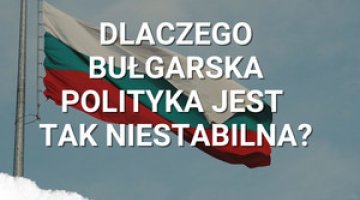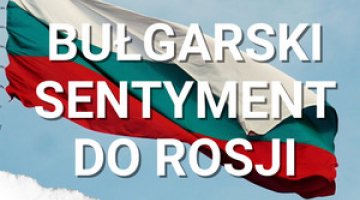Bitter victory for Bulgaria’s centre-right
The early parliamentary elections held in Bulgaria on 5 October will probably not contribute to ending the ongoing year and a half of political instability there. The centre-right Citizens for the European Development of Bulgaria (GERB) grouping, which received the highest support and will probably return to power after over a year in opposition, will have serious difficulties forming a stable coalition. This results not only from the fragmentation of the parliament, but also from GERB’s difficulty in establishing cooperation with any potential coalition partners. A number of major challenges face the next government: widespread corruption, the undermined stability of the financial sector, inefficiency in the energy sector, as well as the need to rise the low standard of living.
The new look of parliament
The early parliamentary elections were caused by the disintegration of the minority government which had been ruling since May 2013, made up of the Socialist and Turkish minority parties. The coalition was unstable from the beginning because of differences in the party programmes and the lack of strong support in parliament (the coalition depended for support in parliament on the xenophobic Ataka party). Its stability was also undermined by the largest public protests since the 1990s which was triggered by the controversial appointment of Delian Pevski, a media mogul and an MP from the Turkish minority party, as head of the important anti-corruption agency DANS (the decision was later withdrawn). The credibility of the government was further harmed by the opaque tender for the Bulgarian section of the South Stream gas pipeline, a process which was challenged by the European Commission. The ultimate collapse of the coalition was brought about by record low support for the Socialists in the European Parliament elections, which prompted the Turkish minority group to leave the coalition.
The elections have led to a major reshuffle of the Bulgarian political scene, and confirmed the deep crisis of public confidence in the groups which had previously sat in parliament. The Parliamentary Assembly now contains a record number of eight groups, four of which are new parties. The highest support (32.6%) scored GERB, which ruled alone in 2009-2013. This party, headed by former Prime Minister Boyko Borisov, won 84 seats in the 240-seat parliament. This means that GERB will not be able to create own government, but at the same time it is hard to imagine any coalition government without it. Next came the Bulgarian Socialist Party (BSP, 15.4%) and the Movement for Rights and Freedoms, representing the Turkish minority (DPS, 14.8%). The new parties are: the right-wing Reformist Bloc coalition (RB, 8.9%), the nationalist Patriotic Front (PF, 7.3%), the populist Bulgaria Without Censorship (BBTs, 5.7%) and the left-wing Alternative for the Bulgarian Revival (ABV 4.1%). Ataka also entered parliament, albeit with a result almost half that of the previous parliamentary elections (4.5%).
Coalition charades
The fragmentation of the parliament will hinder the establishment of a stable and coherent coalition government. The government will probably be formed around Borisov’s party, but it is still hard to be more precise. At the outset GERB ruled out any coalition with its traditional rivals the Socialists, as well as the Turkish minority DPS grouping, which is broadly perceived as an emanation of business’s interests supporting the political elites from behind the scenes. This will force GERB to search for at least two coalition partners to make up the future government. However, it will be difficult for GERB to form a coalition with the other groups. The natural ally for GERB is the Reform Bloc, which shares many points of their platform, but there is a very strong animosity between the parties’ leaders. The Reform Bloc, which itself is deeply divided, has its roots partly in the former anti-communist opposition circles. They are traditionally reluctant to engage with Borisov, as he has taken over the centre-right electorate. In addition, RB has criticised GERB’s support for plans to build the South Stream pipeline, and the expansion of the nuclear power plant in Kozloduy. Another potential partner for GERB is the Patriotic Front. This grouping seems willing to enter into a coalition, but its nationalistic rhetoric may raise tensions with Bulgaria’s neighbours and the EU. Possible cooperation with ABV, the group led by former President Georgi Parvanov, will also be problematic, as its core is made up of former Socialist party politicians. On the other hand, cooperation with the populist BBTs grouping of TV presenter Nikolai Berekov, whose funding sources are unclear, will raise suspicions that the oligarchic system is being recreated. Ataka, with its pro-Kremlin rhetoric and xenophobic views, is the least likely coalition partner for GERB.
Challenges
The future government will have to deal with a number of socio-economic problems. The most urgent is to find a formula for restructuring the fourth largest bank in Bulgaria, the Corporate Commercial Bank (KTB), which has gone into receivership. In September, the European Commission initiated proceedings against Bulgaria, as customers of the bank have not had access to their deposits since June. The process of finding a formula to help the bank has been the subject of fierce political disputes. Financing the KTB from public funds is politically risky, and it could be seen in society as a further proof of the opaque links between the government and business. On the other hand, the bank’s collapse could threaten the stability of the whole banking sector. Another challenge is the necessity of reforming the inefficient energy sector. Most of the state-owned energy companies are in debt; for example, the main electricity producer NEK’s debt passed €1.5 billion in mid-2014. These debts are the result of the generous system of support for renewable energy sources, the poor governance of the state-owned companies, and previously introduced electricity price cuts. Another long-term challenge is to stimulate the country’s economic growth while maintaining financial stability. According to the draft budget update, the deficit in 2014 will amount to 4% of GDP, the highest since 2009.





